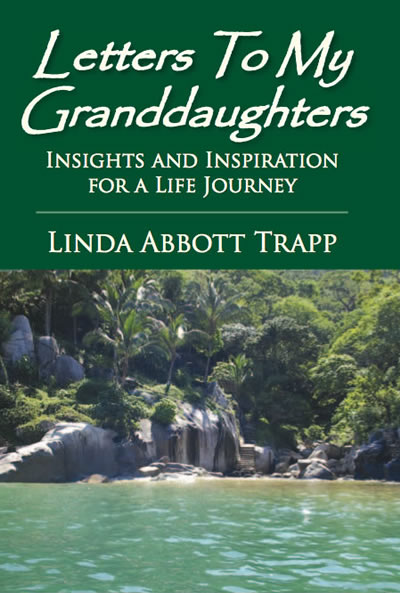The author shares a typical day from her life in Puerto Vallarta and her techniques to reach contentment anywhere.
Directed to her granddaughters, these tips can be applied by anyone of any age.
From Letters To My Granddaughters
 This morning I woke with Max snuggled against the curve of my waist, and Harley nestled into my shoulder on the other side. Both cats were purring in quiet harmony, and they rearranged themselves without a fuss when I stretched and rolled over. Captain Bob reached down and scratched the ears of his twin golden retriever puppies, Lassen and Shasta, and I spoke to Nikki, our old shepherd mix, to see if she was ready to go outside. We sleep in a zoo, and it’s not everyone’s cup of tea, but it’s gentle, friendly, safe, and loving, and I like it that way.
This morning I woke with Max snuggled against the curve of my waist, and Harley nestled into my shoulder on the other side. Both cats were purring in quiet harmony, and they rearranged themselves without a fuss when I stretched and rolled over. Captain Bob reached down and scratched the ears of his twin golden retriever puppies, Lassen and Shasta, and I spoke to Nikki, our old shepherd mix, to see if she was ready to go outside. We sleep in a zoo, and it’s not everyone’s cup of tea, but it’s gentle, friendly, safe, and loving, and I like it that way.
After breakfast, which includes some banana bread with plantains from our yard stirred in, we’ll walk the dogs around the neighborhood, stopping to practice our Spanish by greeting the neighbors. I’ll admire the royal poinciana tree now in full bloom, a cloud of red orchids, and we’ll try to identify the birds so vigorously defending their territories. Then, to church, where I get to have a field day with the pipe organ key I just found on the little keyboard, making the tiny place resound like an old English Presbyterian church. The afternoon will be spent writing, playing music, and swimming, and Captain Bob just said he’d like a little surf fishing this evening for Father’s Day. It’s a lovely way of life, and for the most part, I’m quite content with the mix of labor and leisure, interaction and solitary, thoughtful work.
The part of me that isn’t content is a part I recognize – a bit of ambition, and a bit of greed. Ambition’s a healthy impulse, and greed isn’t, so it takes a little doing to sort it all out. The secret to contentment, I’m told, is to want what you have, simply that. But as Marie Ebner von Eschenback pointed out a century ago, “To be content with little is hard, to be content with much, impossible.” It seems that the more you have, of things, of opportunities, even of education, the more you want. I’ve learned I can write, now I want to paint. I enjoyed the visit with my daughter and grandson, now I’m lonely for more of them. I received a surprisingly generous check, it was sucked up by repairs and bills so fast that I’m eager for more to come my way.
There’s no end to this way of thinking except unhappiness, because there’s no end to craving, if once we yield to greed. No matter how lovely your home, how beautiful your children, how impressive your wages, how large your boat or your diamond, there’s always someone just down the street who has, and flaunts, more. Greed leads to covetousness, which leads to cutting corners to acquire, which leads to a slippery slope, lined in the finest sable, but ending in the erosion of character. And once that’s gone, so is any chance at contentment. Greed simply kills it. If you’ve every wondered why the poets celebrate the contentment of the poor, this explains it. Once the appetites are whetted, satisfaction is elusive indeed.
Ambition is, as I said, a more healthy impulse. Henry Ward Beecher’s comment is very helpful: “We are not to make the ideas of contentment and aspiration quarrel, for God made them fast friends. A man may aspire, and yet be quite content until it is time to raise; and both flying and resting are parts of one contentment.” So, the secret is in the timing, and I may yet learn to paint, once the writing is done. Because all of us are multi-talented, we can benefit by learning to focus, turning our attention, ambition, and aspiration to one talent, then the next, then the next, in due season, building a rich and contented life layer by layer.
I think the chances are better of living that rich and contented life if we spend a little time burrowing into each layer, exploring, nurturing, detailing, and savoring it. Sometimes, in the most unlikely circumstances, real contentment lurks just below the surface. Helen Keller found this to be true. “Everything had its wonder, even darkness and silence, and I learn, whatever state I may be in, therein, to be content.”
Let’s take the layer you two are in now, adjusting to family changes, learning to fit in at school after years of home schooling, becoming young women, with all the transitions and terrors that brings. It would be easy to hurry past this stage, to long for adulthood, or at least full-fledged teen-hood. Any yet, the curiosity you share now, the innocent take on family, local, and national events, the ability to evaluate people’s intentions, are real treasures worthy of study and celebration. If you’ll spend a little time capturing your thoughts and feelings, perhaps in a journal, you won’t overlook the valuable insights you have, right on the tip of your tongue. And maybe, just maybe, you’ll be a bit more contented with being who you are just now, at this age and in this place.
I’ll try to do the same. There are days I’m tempted to un-retire, go back to “being somebody” full-time again, to the competitive rush and the fat paychecks and the constant pressure. But it passes, and I know that this, for the moment, is enough, to write and walk and swim and seek, to love and live this way, right here, right now, in precarious and precious contentment.
- Learn to want what you have, more often, more fully
- Savor the life stage you are in right now
- Avoid the cravings that lead to greed and discontent
- Balance ambition and repose
Workbook Questions:
1. What is the best part of the life stage you are in now? How can you enjoy it more fully?
2. Have you ever experienced intense greed and craving? What led to it? Did it result in happiness? How have you overcome it?
3. Who is the most contented person you know? Could you ask that person to talk about what gives them that deep level of satisfaction?
Published or Updated on: December 1, 2007 Linda Abbott Trapp is the author of Ornamental Plants and Flowers of Tropical Mexico, 2006

